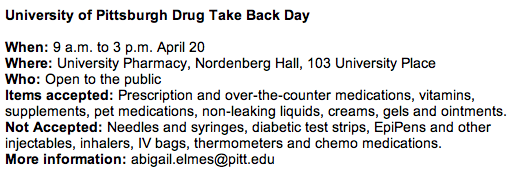With Upcoming Drug Take Back Day, School of Pharmacy Adds to University-wide Efforts to Combat Opioid Epidemic

As the opioid overdose epidemic grips the United States, the University of Pittsburgh is turning its own resources toward battling this public health emergency.
According to a December 2016 report by the Centers for Disease Control and Prevention (CDC), opioid-related drug overdoses killed more than 33,000 people in 2015, the most of any other year on record — and more than half of those deaths involved prescription drugs. Additionally, the CDC reports that deaths from prescription opioids — drugs such as oxycodone, hydrocodone and methadone — have more than quadrupled since 1999.
Pitt’s upcoming Drug Take Back Day, scheduled for April 20, is one of the many endeavors at the University to address the ongoing crisis.

“We’re trying to prevent drugs from getting into the wrong hands,” says Jim Pschirer, assistant professor of pharmacy and therapeutics at Pitt’s School of Pharmacy. The school and its students, along with the U.S. Drug Enforcement Agency, the Division of Student Affairs, the Pitt Police Department and the Pennsylvania Resources Council have been involved with Drug Take Back Days — collecting unused or expired prescription or over-the-counter medication — since 2010.
Justin Saver, a third-year pharmacy student who has led the effort for Pitt for the past three years, said 245 pounds of drugs were collected on the University’s last Drug Take Back Day on October 21, 2016. Since 2015, 1,115 pounds of medication have been collected.
Getting unused medications out of the house is an important way to avoid possible drug abuse, as the cycle of dependency and addiction frequently begins with physician-sanctioned prescription drugs.
Take-back efforts are important because it’s not enough to throw the drugs in the trash or flush them down the toilet, Pschirer adds. When drugs go down the drain, they eventually find their way back into the water supply. Filtration systems aren’t sophisticated enough to remove such small chemical compounds. Studies have found traces of antibiotics, hormones and other substances in water samples.
With fellow pharmacy students, Saver, who is also operation leader of Pitt’s GenerationRx initiative — an organization that provides prescription drug abuse prevention materials to schools, colleges and communities through its partnerships with the American Pharmacists Association-Academy of Student Pharmacists, among others — has been giving presentations to middle and high school students about the dangers of prescription drug abuse. Their presentation was developed by CVS Health as part of a program called One Choice. It has been implemented by pharmacists across the country, but Pitt is the first university partner, and Pittsburgh Public Schools is the first urban school district to partner with CVS Health to deliver the presentations to their students, Saver says.
Larry Merlo (PHARM ‘78) a Pitt Board of Trustees member and president and chief executive officer of CVS Health has supported the yearlong development of One Choice, along with his staff. Merlo last year received Pitt’s highest alumni honor: the Distinguished Alumni Fellow award.
To help fill the gaps between Drug Take Back Days, Pitt student pharmacists participate in weekly drug disposal events where they help to educate patients at pharmacies on best practices for medication disposal. Additionally, Saver hopes to set up Drug Take Back Days in other parts of the city, and says brainstorming is underway to make the biannual Take Back Days a year-round endeavor with collection units, “because what we’ve come to realize is that people stock up for these things. They come in with big bags a lot of the time.”
Future plans, supported by School of Pharmacy Dean Patricia Kroboth and Senior Associate Dean Randy Smith, are in the works to generate new GenerationRx partnerships to expand the local and national reach of the organization, furthering Pitt’s commitment to combatting the opioid crisis.
***
In addition to regular Drug Take Back Days, Pitt efforts regarding the epidemic have included the following:
- The Institute of Politics last year put together a 62-page comprehensive report with guidelines and recommendations for a continuum of care approach to fighting the epidemic. Ten Pitt schools, departments and centers contributed to the report.
- Eight Pitt experts including Chancellor Emeritus Mark A. Nordenberg; Michael Zemaitis and Janice Pringle of the School of Pharmacy; and others in the Schools of Medicine and Public Health, UPMC, the Institute of Politics and the VA Pittsburgh Healthcare System, sit on the U.S. Attorney's Working Group on Addiction: Prevention, Intervention, Treatment and Recovery. The group was originally chaired by then-U.S. Attorney for the Western District of Pennsylvania, David J. Hickton.
- In 2015, and as a result of the working group’s efforts, the U.S. Department of Justice asked Hickton to chair the National Heroin Task Force. In 2016, he became the founding director of Pitt's Institute for Cyber Law, Policy and Security.
- OverdoseFreePA is a website started by Pringle and the School of Pharmacy’s Program Evaluation and Research Unit. It’s a one-stop shop for resources and evidence-based prevention strategies. It centralizes support for families, communities and those addicted to drugs to educate, increase awareness and help people on the way to recovery.
Can't make it to Thursday's Take Back Day? National DEA Drug Take Back Day is the following week on Saturday, April 29, from 10 a.m. to 2 p.m. April 29 at various locations. More details on the DEA website.
Other Stories From This Issue
On the Freedom Road

Follow a group of Pitt students on the Returning to the Roots of Civil Rights bus tour, a nine-day, 2,300-mile journey crisscrossing five states.
Day 1: The Awakening
Day 2: Deep Impressions
Day 3: Music, Montgomery, and More
Day 4: Looking Back, Looking Forward
Day 5: Learning to Remember
Day 6: The Mountaintop
Day 7: Slavery and Beyond
Day 8: Lessons to Bring Home
Day 9: Final Lessons

